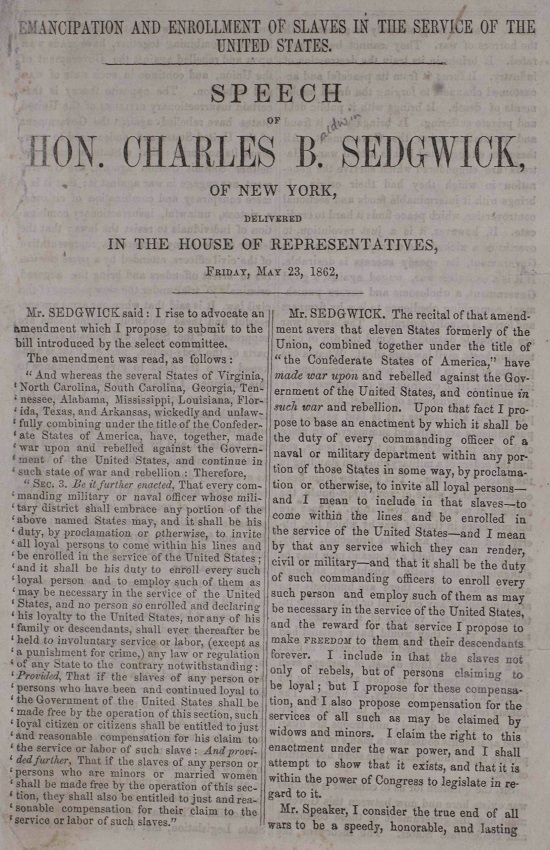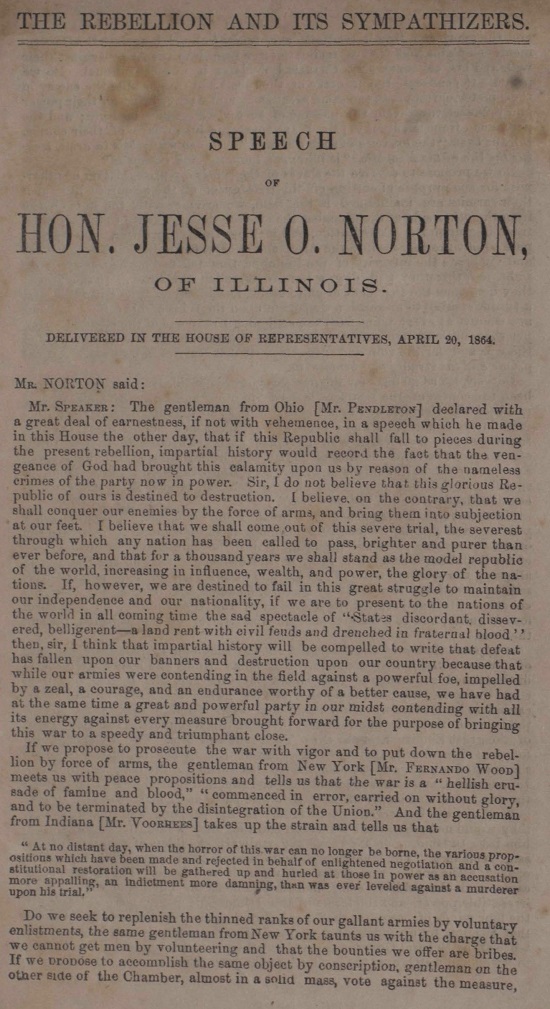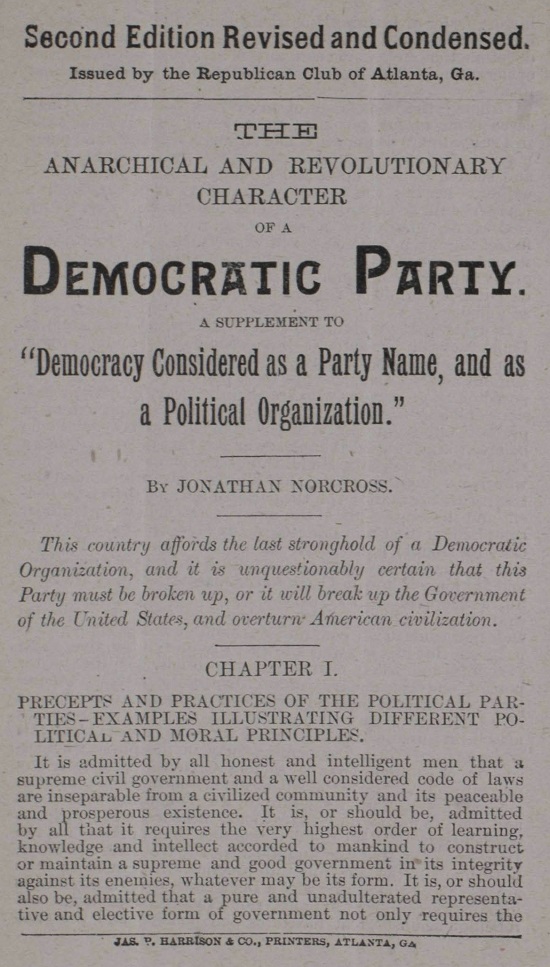‘All the Hypocritical and Lying Tactics’: Highlights from the American Civil War Collection, 1860-1922
The October release of The American Civil War Collection, 1860-1922, includes speeches and published works taking partisan positions such as on enrolling slaves in service of the Union, the prosecution of the war, and more.

Emancipation and Enrollment of Slaves in the Service of the United States (1862)
Speech of Hon. Charles B. Sedgwick, of New York
Charles Baldwin Sedgwick (1815-1883) practiced law in Syracuse, New York, before being elected to the House of Representatives, serving in the 36th and 37th Congresses. On May 23, 1862, Sedgwick spoke in favor of allowing the enlistment of slaves and offering freedom to those who did so. He began by reading an amendment to a bill introduced by the select committee.
And whereas the several States of Virginia, North Carolina, South Carolina, Georgia, Tennessee, Alabama, Mississippi, Louisiana, Florida, Texas, and Arkansas, wickedly and unlawfully combining under the title of the Confederate States of America, have, together, made war upon and rebelled against the Government of the United States, and continue in such state of war and rebellion.
After reading the amendment in full, Sedgwick paraphrases key pieces.
…I propose to base an enactment by which it shall be the duty of every commanding officer of a naval or military department within any portion of those States in some way, by proclamation or otherwise, to invite all loyal persons—and I mean to include in that slaves—to come within the lines and be enrolled in the service of the United States—and I mean by that any service which they can render, civil or military—and that it shall be the duty of such commanding officers to enroll every such person and employ such of them as may be necessary in the service of the United States, and the reward for that service I propose to make FREEDOM to them and their descendants forever….I claim the right to this enactment under the war power…
He continues speaking, using analogy and labeling his opposition as appeasers of the rebels.
And here let me inquire, who opposes the employment of these men? The men who are actually fighting the battles of the country do not oppose it. You go through a forest with a black man, and meet a beast of prey; you do not ask him to stand aside behind a tree while you alone fight the ferocious animal; you are willing that he should take his club and deal such blows as he can. And this same principle of common sense will arm every loyal man in this country who is willing to serve the country in this extremity. Nobody opposes it except those who think that it will exasperate the rebels in arms against us, the hyenas who violate the resting-places of the dead, and wear skulls of our fellow citizens as ornaments to their girdles. Nobody is afraid of it except those who think it will exasperate this kind of men.

The Rebellion and its Sympathizers (1864)
Speech of Hon. Jesse O. Norton, of Illinois
Jesse Olds Norton (1812-1875) served in the 33rd Congress as a Whig, in the 34th as a member of the Opposition Party, and in the 38th as a Republican. Responding to the claims of Democrat George H. Pendleton, Norton spoke in the House of Representatives on April 20, 1864.
The gentleman from Ohio declared with a great deal of earnestness, if not with vehemence, in a speech which he made in this House the other day, that if this Republic shall fall to pieces during the present rebellion, impartial history would record the fact that the vengeance of God had brought this calamity upon us by reason of the nameless crimes of the party now in power.
Unsurprisingly Norton felt the opposite was true, arguing the fault lay with the obstructionists.
If we propose to prosecute the war with vigor and to put down the rebellion by force of arms, the gentleman from New York [Mr. Fernando Wood] meets us with peace propositions and tells us that the war is a “hellish crusade of famine and blood,” “commenced in error, carried on without glory, and to be terminated by the disintegration of the Union.”….
Do we seek to replenish the thinned ranks of our gallant armies by voluntary enlistments, the same gentleman from New York taunts us with the charge that we cannot get men by volunteering and that the bounties we offer are bribes. If we propose to accomplish the same object by conscription, gentleman on the other side of the Chamber, almost in a solid mass, vote against the measure, and the gentleman from New York ever ready to inveigh against the Government, complains that we are trying to force men into the Army against their will and his colleague [Mr. Chanler] declares it unconstitutional. Do we propose to confiscate the property of the rebels and thus cripple the enemy in their material resources, the same great Democratic party bring all their power and influence to prevent the passage of such a wholesome measure; and the gentleman from Kentucky [Mr. Wadsworth] in justification of their course, tells us that “the exercise of such a power,” even against rebels in arms, seeking the life of the Republic, “is inhuman, immoral, and infamous.”
Do we propose to set free the slaves of the rebels by proclamation or otherwise for the purpose of cutting off this greatest of all the resources by which their armies are maintained in the field, we are met with the stale charge from the other side of the Chamber that we are doing violence to State rights, trampling upon the Constitution, and making this a negro war. Do we propose to put the negroes into the Army and allow them to help fight our battles and vindicate the integrity of the Republic, they tell us that negroes will not fight, and that they will disgrace and demoralize the Army. In one breath they denounce the President as an imbecile, and in the next as a usurper and a tyrant seeking to establish a despotism upon the ruins of his country.

The Anarchical and Revolutionary Character of a Democratic Party (1865)
By Jonathan Norcross
Jonathan Norcross (1808-1898) was elected Atlanta, Georgia’s fourth mayor, 1851-1852, as a member of the Moral Party. The race hinged on the temperance issue, and the Free and Rowdy Party’s candidate, Leonard Simpson, was defeated. Norcross was later a candidate for Georgia governor and continued writing, authoring several articles and essays, after the war. In this 1865 publication Norcross lays the blame for the war with the Democratic Party.
In a discussion like this the question naturally and almost irresistibly arises who, and what party or parties, and what interests sowed the seeds and worked up the great Rebellion that cost the American people billions of wealth and a million young men, the flower of the land?
Was it the people of the eleven seceding States as a whole? No, by no means; for after more than thirty years of agitation by the Democratic leaders and organs of the North, the South, the East and the West, with this object or result staring them in the face, less than one-third of the voters of the eleven seceding States could be induced to declare for the Rebellion and we may reasonably infer that if the question of war and bloodshed had been fairly put before them not one-fourth of the people would have voted for it. That the Northern and Western Democratic leaders and organs were as much responsible for the starting of the great Rebellion as the leaders and organs of the South was shown by the violence and bitterness of the language with which they opposed the suppression of the Rebellion.
Was it slavery, or the owners of slaves in the South, that sowed the seeds and created this destructive warfare? No, by no means, for the whole number of slave owners was not much over 300,000, and as everybody knows, or ought to know, more than one-half and probably two-thirds of them were opposed to any such measure as an armed rebellion. It was not therefore the slave owners that sowed the seeds or worked up the great Rebellion.
Was it the abolutionists [sic] of the North and West that sowed the seeds and raised the Rebellion? By no means, for they were too few to undertake such a job. And besides not one out of ten dreamed of, or wished for, a civil war on account of slavery. They regarded the people of the slave States as a set of braggarts, on the same principle and with about as much sense as the leading Democrats and organs of the South regarded the Northern people as a set of cowards, when in fact their talk on either side had in it scarcely a semblance of truth. Hence it was not the abolutionists [sic] that did this work.
Was it the people of the North and West as a whole that desired and worked up the Rebellion? No, by no means, for their best and bravest men went upon their knees and begged the Southern Democratic leaders to refrain from such a movement, and even Abraham Lincoln, after he had been elected president of the United States, pleaded with the Democratic leaders and promised them all they could reasonably ask if they would but desist from their mad and crazy scheme.
The foundation for the great Rebellion was laid during the incipient years of the Democratic party, commencing about 1830, or to speak more emphatically, during the Jackson, Van Buren and Benton Democratic reign of financial ruin and disaster. But to speak more definitely, as soon as the Democracy gained supreme power and control of the government, which it did about the year 1830, a few natural and genuine Democrats, such as are found in all civilized communities, men we may say of shrewdness and skills in politics, men of ambition and unscrupulous designs, seeing and understanding the anarchical and revolutionary characteristics and proclivities of a Democratic party, conceived the idea of overturning and destroying the Constitution and government of the country. And having once entertained such ideas nothing could be more natural to them to co-operate at, if not employ, all the hypocritical and lying tactics natural to, and inseparable from, a Democratic organization.
For more information about The American Civil War Collection, including pricing for your institution, please contact Readex Marketing.



